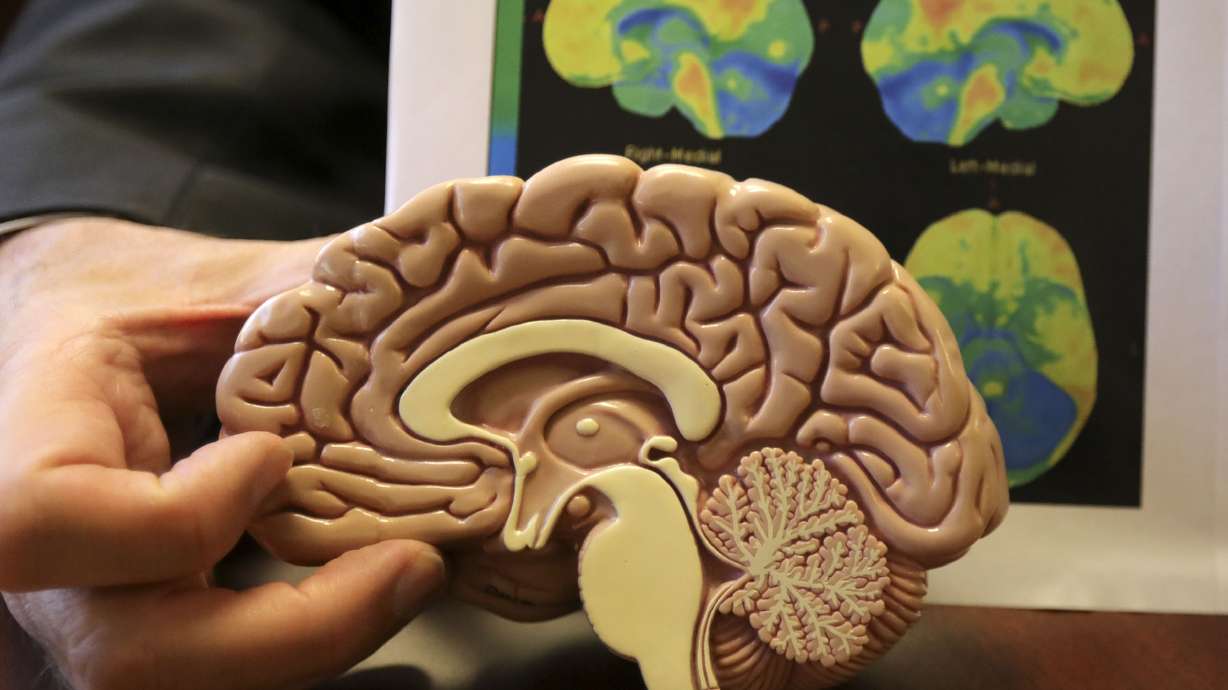Estimated read time: 4-5 minutes
This archived news story is available only for your personal, non-commercial use. Information in the story may be outdated or superseded by additional information. Reading or replaying the story in its archived form does not constitute a republication of the story.
SALT LAKE CITY — Few caregivers are trained to care for loved ones who have Alzheimer's disease or other forms of dementia, which can make them feel isolated and underprepared, says Utah State University researcher Elizabeth Fauth.
It can also result in mental, emotional and physical fatigue from providing round-the-clock care and navigating the patient's challenging behaviors, such as asking the same questions repeatedly, agitation, wandering, and the loss of reciprocity the relationship they once had with that person, said Fauth.
Caregivers may be hard-pressed to meet the patient's demands, let alone manage their stress or tend to their own needs. While some Utah communities have support services, many caregivers find it difficult to leave home to participate in them.
A group of USU researchers has developed a free online program to teach caregivers research-backed techniques to manage stress. Research shows if caregivers understand dementia, what to expect and can focus on managing their own stress levels, over time, they do better physically and mentally.
The program, ACT for Caregivers, was developed by USU researchers Fauth, Joshua Novak and Michael Levin. They have collective expertise in traditional and online delivery of Acceptance and Commitment Therapy and in dementia caregiving. The project is funded by USU Extension.
Caregivers can take the 10-session, web-based course at their own pace. Each session takes about 20 minutes to complete. Researchers recommend taking a few days between sessions to practice the techniques they learn. There is also an online library of resources, videos and articles for caregivers.
“We understand that caregivers have a hard time getting out and going to a class, so an online presentation seemed like the best fit,” said Marilyn Albertson, USU Extension associate professor of family and consumer sciences.
The current program, which has a research component, is limited to caregivers of people with forms of dementia or Alzheimer disease. Caregivers who complete the 10-session training and surveys receive $50 compensation. To enroll, contact Alex Schiwal at 435-915-6207.
Learning coping strategies helps caregivers find more personal life balance and helps them function better as caregivers.
Fauth said one challenge to connecting caregivers to helping resources is many caregivers don't recognize they are caregivers. They consider the care they give a parent or spouse just part of their roles as spouse or child.
"Sometimes that can prevent them from seeking any kind of help if they don't see themselves in a special situation," Fauth said.
Regardless, they struggle with the same frustrations, sense of loss, and physical and emotional fatigue as people who do identify themselves as caregivers.
“There is often grief, even though the person is still alive, because the person’s abilities have declined from what he or she could remember and do before the disease," Fauth said.
Researchers hope the ease of accessing an online program will encourage people taking care of loved ones with forms of dementia and Alzheimer's disease to devote 20 minutes twice a week to skill building.
It's important that people seek help instead of shouldering the responsibility on their own because when they are under stress, caregivers can develop negative thoughts. Because these thoughts are uncomfortable, people tend not to deal with them or they may engage in unhealthy behaviors or otherwise neglect their own emotional and physical well-being, Albertson said.
Fauth, associate professor in USU's Department of Human Development and Family Studies, said the need for caregiving support is immense.
According to the Alzheimer's Association, there were 155,000 people in Utah who are provided 177,000 hours of unpaid care to loved ones who have the disease in 2018.
There is often grief, even though the person is still alive, because the person’s abilities have declined from what he or she could remember and do before the disease.
–Utah State University researcher Elizabeth Fauth
USU researchers have funding to cover 109 participants for the online program. So far 25 people have completed the course and eight are taking it. The research team seeks additional participants to receive the free training and compensation, which will allow researchers can obtain more feedback about their experiences using the tool.
Fauth said the researchers seek to refine the tool based on participant input. The funding to compensate participants will eventually phase out, but the researchers hope the tool that remains will be available for caregivers into the future. The researchers hope to someday to offer a similar tool to people who care for loved ones who have chronic diseases, Fauth said.
While the program is specifically designed to help caregivers build skills they can use to better cope with caregiving, initial feedback indicates that participants use the techniques they have learned "in life in general," Fauth said.
Early indications are four weeks after people complete the training and final assessment, they are "still maintaining high levels of success," Fauth said.
"When you learn skills, you don't unlearn them. They keep using the skills long after the study is done."
For information on the course, contact Fauth at beth.fauth@usu.edu or Marilyn Albertson at Marilyn.albertson@usu.edu.










